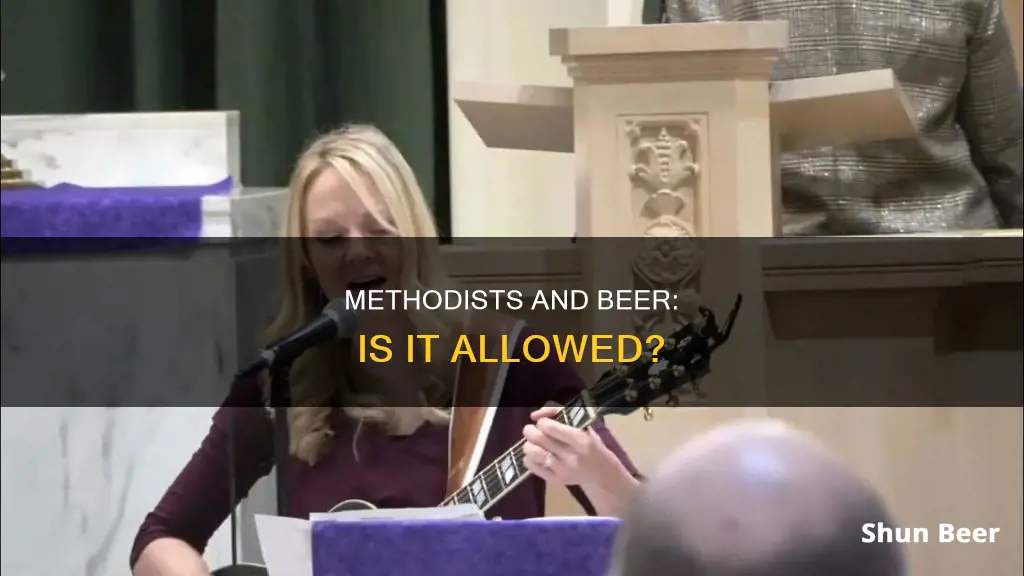
The Methodist movement within Protestant Christianity was historically known for its members' strict moral convictions, which included prohibitions on playing card games, dancing at balls, and moderate social drinking. While the United Methodist Church encourages abstinence from alcohol as a faithful witness to God's love, it does not prohibit members from consuming alcohol responsibly and in moderation. This shift in attitude towards alcohol consumption among Methodists reflects a departure from the tradition's historical stance, with a growing number of Methodists partaking in social drinking while still emphasizing the importance of avoiding drunkenness.
| Characteristics | Values |
|---|---|
| Methodist views on drinking alcohol | More than half of US Methodists acknowledge drinking from time to time |
| Historical view | Prohibited |
| Methodist founder's view | John Wesley was a drinker of malt ale who despised the use of hops in brewing and advised church members to "taste no spirituous (distilled) liquor ... unless prescribed by a physician." |
| Current United Methodist Church view | "We do not prohibit our members from [drinking alcohol] so responsibly 'with deliberate and intentional restraint.' However, The United Methodist Church has long believed that abstinence from alcohol and other drugs witnesses to 'God’s liberating and redeeming love' and is part of living into the life God has prepared for us." |
| Alcohol at communion | Most Methodist churches serve grape juice instead of wine for communion. |
What You'll Learn

Methodist founder John Wesley's relationship with alcohol
On the other hand, Wesley was firmly against drunkenness and advised church members to "taste no spirituous (distilled) liquor... unless prescribed by a physician". He was concerned about drinking beyond moderation, particularly the consumption of hard liquors and spirits, which he believed brought people down. Wesley's overall theme on life was moderation in everything.
Wesley's views on alcohol were reflected in the early Methodist Church, which took a firm stand in favour of teetotalism and helped to make alcohol illegal in America during Prohibition (1920-1933). Even in the late 1980s, a women's temperance club at the West End United Methodist Church in Birmingham condemned all drinking of alcohol. Today, the United Methodist Church accepts abstinence and judicious consumption with restraint, while actively discouraging consumption for those under 21 and in high-risk situations.
Beer, Valsartan, and Amlodipine: Is It Safe to Drink?
You may want to see also

The Methodist church's stance on drinking alcohol
In its early years, the Methodist movement within Protestant Christianity was known for its members' rigid discipline and strict moral convictions, which included abstaining from moderate social drinking. Temperance was a key doctrine for Methodists, who believed in keeping the body's sanctification and purity. They supported this stance with various scriptures, such as Proverbs 20:1, which states that alcohol creates "a mocker, strong drink a brawler, and whoever is led astray by it is not wise."
However, in more recent times, the Methodist Church's position has shifted towards cautious permissibility, allowing individuals to decide for themselves whether to partake or abstain from alcohol. While the Church does not outwardly support drinking, it also does not prohibit its members from consuming alcohol responsibly, with "deliberate and intentional restraint." This shift in perspective is reflected in a 2017 Lifeway Research study, which found that 62% of Methodists acknowledged taking a drink from time to time.
Despite this change, the Methodist Church still emphasizes that abstinence from alcohol is preferable and is seen as a faithful witness to "God's liberating and redeeming love." They believe that abstinence demonstrates personal discipline and social righteousness and is an effective way to show love and support for those negatively affected by alcohol. The Church is committed to addressing substance abuse and advocates for the prevention and treatment of alcohol abuse.
In summary, while the Methodist Church does not explicitly prohibit alcohol consumption, it encourages its members to consider the benefits of complete abstinence and to be sensitive to the potential negative consequences of alcohol. The Church's stance can be characterized as one of cautious permissibility, combined with wisdom and discretion.
Beer and Hyperthyroidism: What You Need to Know
You may want to see also

Alcohol in Methodist communion
Alcohol consumption among Christians, including Methodists, has always been a controversial topic. While some emphasize the positive examples of alcohol in Scripture, such as Jesus turning water into wine, others highlight the warnings against drunkenness. The Methodist movement within Protestant Christianity was known for its members' strict moral convictions, which included prohibiting moderate social drinking.
Today, most Methodists believe that drinking a moderate amount of alcohol in a social setting is permissible, as long as it is done responsibly and with restraint. However, the United Methodist Church continues to emphasize abstinence from alcohol as a way to demonstrate "God's liberating and redeeming love." They also recognize the potential for alcohol abuse and the negative impact it can have on individuals, their loved ones, and society. As a result, the Church is committed to addressing substance abuse and supporting those affected by it.
Historically, the Methodist Church played a significant role in the temperance movement, advocating for total abstinence from alcohol. In the 1800s, the church used wine during communion, but some congregations sought alternatives like grape juice or water. The debate over using fermented or unfermented wine for communion continued for decades. In 1864, the General Conference of the Methodist Episcopal Church recommended using "the pure juice of the grape" for the Lord's Supper. However, it was not until the late 19th century that most Methodist churches transitioned to using grape juice instead of wine during communion.
Dr. Thomas B. Welch, a Methodist Episcopal communion steward, played a crucial role in this transition. In 1869, he developed a process for pasteurizing grape juice to prevent fermentation and provided an alcohol-free substitute for communion. Despite initial challenges, his son Charles revived the idea and successfully promoted it to churches, eventually leading to the widespread use of Welch's Grape Juice during communion.
In summary, while the Methodist Church does not prohibit alcohol consumption, it encourages members to consider the benefits of abstinence and to be sensitive to the potential negative consequences of alcohol. The Church's historical involvement in the temperance movement and the development of grape juice as a communion alternative reflect its commitment to addressing the social issues associated with alcohol consumption. Today, most Methodist churches use grape juice during communion out of pastoral concern for those with alcohol-related problems and to enable the participation of children and youth.
Drinking Beer at Solomon's Island Boat Ramp: Is it Allowed?
You may want to see also

Methodists' role in the Temperance movement
Methodists have had a long and complex relationship with alcohol, and their role in the Temperance Movement has been significant. While total abstinence from alcohol has never been a mandatory condition of being a Methodist, the religion has historically leaned towards encouraging abstinence and warning about the dangers of alcohol abuse.
The founder of the Methodist Church, John Wesley, proclaimed in 1743 that "the buying, selling, and drinking of liquor, unless absolutely necessary, were evils to be avoided". This sentiment was echoed by other prominent Methodists in the following centuries, and the Methodist Church became closely aligned with the Temperance Movement.
The Methodist Episcopal Church Board of Temperance, Prohibition, and Public Morals was a major organisation in the American Temperance Movement, which led to the introduction of Prohibition in 1920. It was headed by Clarence True Wilson, who travelled widely to promote temperance and prohibition. The Methodist Episcopal Church South also had a similar agency, the Board of Temperance and Social Service, which was associated with Bishop James Cannon, Jr.
The Methodist Temperance Magazine, launched in 1868, and the adoption of 'Resolutions respecting Temperance' by the Conference in 1874, further solidified the Methodist Church's stance on alcohol. A Wesleyan Methodist Temperance Committee was established in 1875 to encourage abstinence and warn about the dangers of alcohol abuse. The Methodist Church also supported the formation of Bands of Hope, which aimed to teach working-class children about the importance of sobriety and teetotalism.
While the Methodist Church played a significant role in the Temperance Movement, there were also internal debates between 'prohibitionists' and 'moral suasionists'. The Primitive Methodists, for example, were less hesitant about the need for temperance advocacy, especially after the 1830 Beer Act. They played a significant part in the Temperance Movement and organisations such as the Independent Order of Rechabites.
Today, the practice of total abstinence is less widespread among Methodists, and few churches maintain an 'abstainer's roll'. However, the Methodist Church still recognises the dangers of alcohol abuse and its role in wider drug addiction issues. The Church is associated with centres for treatment and rehabilitation, and continues to insist on responsible attitudes and legislative control of the alcohol trade.
Beer and Workouts: Light Beer's Impact on Fitness
You may want to see also

The Bible's influence on Methodist drinking habits
The Methodist Church has historically been associated with teetotalism and the temperance movement, with abstinence from alcohol viewed as a way to demonstrate "God's liberating and redeeming love". However, in recent years, there has been a shift in attitudes, and a growing number of Methodists now consume alcohol in moderation. This change in perspective is reflected in a 2017 Lifeway Research survey, which found that 62% of Methodists acknowledged drinking alcohol occasionally.
The Methodist Church's historical stance on alcohol has been influenced by various biblical passages. Proverbs 20:1, for example, warns that "a mocker, strong drink a brawler, and whoever is led astray by it is not wise". Similarly, 1 Peter 5:8 advises Christians to "be sober-minded and watchful" as "your adversary the devil prowls around like a roaring lion". These and other scriptures have been used to support the Methodist Church's traditional emphasis on temperance and abstinence.
However, not all biblical passages related to alcohol are negative. For instance, Jesus's first miracle, turning water into wine at the Wedding at Cana (John 2:1-11), has been interpreted as a positive example of alcohol consumption. Additionally, Ecclesiastes 9:7 states, "Go, eat your bread with joy, and drink your wine with a merry heart", suggesting that drinking in moderation can be enjoyable and acceptable.
In conclusion, while the Methodist Church has historically emphasised abstinence from alcohol, influenced by certain biblical passages warning against drunkenness, recent years have seen a shift towards more permissive attitudes. Many Methodists now interpret the Bible as allowing for moderate alcohol consumption, and the Church has come to respect individual freedom in this regard. Nonetheless, the Methodist Church remains cautious about the potential negative consequences of alcohol and continues to promote abstinence as a way to demonstrate love for God and neighbour.
Beer and Joint Pain: Is There a Connection?
You may want to see also
Frequently asked questions
Methodists are not prohibited from drinking alcohol, but they are encouraged to do so responsibly and in moderation.
The Methodist Church has long believed that abstinence from alcohol and other drugs is a faithful witness to "God's liberating and redeeming love". However, they do not prohibit members from drinking alcohol, as long as it is done with "deliberate and intentional restraint".
No, Methodists were once famous teetotalers and strong advocates for temperance and prohibition. In the late 1950s, a majority of Methodists still believed that Christians should totally abstain from alcohol. However, attitudes towards alcohol consumption have shifted over time, and today, a significant number of Methodists do drink alcohol.
Methodists, including their founder John Wesley, were once strong proponents of temperance and played a significant role in the Prohibition movement in the United States. John Wesley himself was a drinker of malt ale but advised church members to abstain from distilled liquor unless prescribed by a physician. Over time, Methodists' views on alcohol have become more relaxed, and today, the Methodist Church encourages responsible drinking with intentional restraint.
The Methodist Church uses grape juice instead of wine for communion, reflecting their historical commitment to temperance and abstinence from alcohol.







